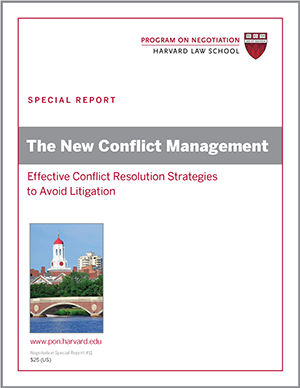
When closing a deal, new business partners are typically optimistic about the path ahead. But somewhere down the line, conflict is almost inevitable. One party may miss a deadline. The two sides may interpret contract terms differently. Changing economic conditions may make it difficult for one side to uphold its end of the deal.
When a business partnership is faltering, what conflict management strategies can help them work through a crisis together? Negotiation and decision-making consultant John S. Hammond, along with Ralph L. Keeny and Howard Raiffa, co-authors of the book Smart Choices: A Practical Guide to Making Better Decisions, have outlined three steps you can take to confront conflict as effectively as possible.
1. Feel the Other Side’s Pain
The next time you find yourself worrying that high oil prices will prevent you from filling a customer’s order, remember this: she’s probably just as stressed about the situation as you are.
It’s a simple fact: in negotiation, your problem is likely the other side’s problem, and vice versa. If your company can’t fulfill an order, your customer may be in serious trouble regarding her own finances and commitments to other parties.
This knowledge can help improve your conflict management skills. For example, the customer may be willing to renegotiate the price with you if she needs the product badly enough and sees value in maintaining a relationship with you and your organization.
Just knowing that the other party has a strong interest in working with you to resolve your problems can provide you with a psychological boost, says Hammond. Take the time to make a list of what your counterpart’s difficulties might be. Understanding that your counterpart is motivated to work with you to solve problems can promote conflict negotiation and help you collaborate to avoid worst-case scenarios, such as mortgage foreclosures, damaged reputations, and lawsuits.
2. Change the Players
When a deal sours during the implementation stage, there are advantages to having the person who negotiated the original terms engage in conflict management and a potential contract negotiation. He knows the situation well, of course, and may have developed a level of rapport and trust with the other side that can help the parties revise their agreement.
But from management’s perspective, the deal that results from this renegotiation may not be in the organization’s best interest. Those involved in the original relationship may make overly large concessions in an attempt to salvage the deal.
For example, Hammond found that commercial bankers who originated loans that aren’t paying off tended to be too slow to recognize signs of trouble and too willing to advance more money to help the borrower recover. (Psychologists call this tendency to throw good money after bad the sunk-cost trap.) Hammond’s recommendation: Turn problem loans over to people who can look at the situation with fresh eyes and who are skilled at dealing with them.
Similarly, when facing the need for conflict negotiation, you and your organization might consider whether it would be wise to have new negotiators take over conflict resolution efforts. People whose reputations aren’t as strongly invested in the original contract may be able to view the conflict more objectively.
3. Reframe the Problem
When engaged in conflict negotiation concerning an ongoing business deal, we tend to focus on potential losses as compared with the expectations we had when the original deal was signed. But when negotiations are framed in terms of losses, conflict management strategies often fail.
Consider that negotiators tend to pay more to avoid a loss than to gain a financially equivalent benefit, according to professors Harris Sondak of the University of Utah and Adam D. Galinsky of Northwestern University. Because negative events affect us much more strongly than positive events, a conflict negotiation over costs and losses is likely to be more competitive and challenging than a negotiation over benefits and assets.
To overcome this trap, think in terms of the realities of the new status quo, not what used to be, Hammond advises. In the case of a mortgage default, for example, the new status quo would be foreclosure. This means the lender will sell the house at a loss, and the buyer will lose his equity and have to move.
When parties begin to look at the problem this way, they become capable of viewing any deal that avoids the worst possible outcome as a gain for both parties—a mindset that is likely to lead to greater cooperation and creativity.
What other strategies have you found to be useful in conflict negotiation?




